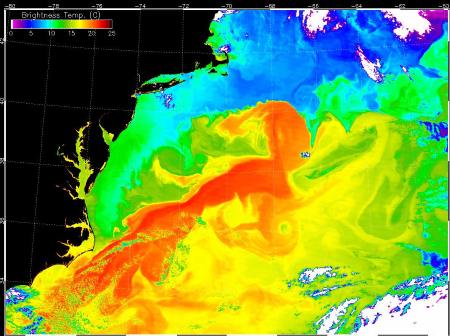Climate Change: Scientists Concerned about the Gulf Stream
Climate Scientists are becoming increasingly concerned about a potential collapse of the Gulf Stream, one of the planet’s potential tipping points according to a new study by researchers in Germany.
Published 4 years ago
Climate tipping points are large, fast and irreversible changes to the climate and scientists are reporting research has detected warning signs of the potential collapse of the Gulf Stream.
The Guardian reports that a new study has found “an almost complete loss of stability over the last century” of the currents that researchers call the Atlantic Meridional Overturning Circulation (AMOC). The currents are already at their slowest point in at least 1,600 years, but the new analysis shows they may be nearing a shutdown.
Niklas Boers, a researcher at the Potsdam Institute for Climate Impact Research in Germany and author of the study into climate change and ocean currents, said “the findings support the assessment that the AMOC decline is not just a fluctuation or a linear response to increasing temperatures, but likely means the approaching of a critical threshold beyond which the circulation system could collapse.”
Gulf Stream “Conveyor Belt” Weakening
The Atlantic Meridional Overturning Circulation includes the Gulf Stream and is responsible for moderating large parts of the world’s climate. The currents work like a conveyor belt to transport warm, salty water northward from the tropics and cold water back south along the seafloor. This giant conveyor belt had already been shown to be at its weakest in more than a thousand years, but now it could be veering toward a total breakdown.


- View of the Gulf Stream from NASA Earth Observatory.
The researchers originally published their findings on August 5, 2021 in the journal Nature Climate Change.
IPCC Report shows Climate Changes in every Region
In related news, the Intergovernmental Panel on Climate Change (IPCC) released its latest report on August 9 2021, which stated that Scientists are observing changes in the Earth’s climate in every region and across the whole climate system. Many of the changes observed in the climate are unprecedented in thousands, if not hundreds of thousands of years, and some of the changes already set in motion—such as continued sea level rise—are irreversible over hundreds to thousands of years.
The Intergovernmental Panel on Climate Change (IPCC) is the UN body for assessing the science related to climate change. It was established by the United Nations Environment Programme (UNEP) and the World Meteorological Organization (WMO) in 1988 to provide political leaders with periodic scientific assessments concerning climate change, its implications and risks, as well as to put forward adaptation and mitigation strategies. In the same year the UN General Assembly endorsed the action by the WMO and UNEP in jointly establishing the IPCC. It has 195 member states.
………………………………………………………………………………………………………………………………….
Related News:
- Early Warning Signs for the Collapse of the Atlantic Meridional Overturning Circulation (Nature.com)
- Climate Crisis: Scientists sport warning signs of Gulf Stream Collapse (The Guardian)
- Gulf Stream could be veering towards collapse (space.com)
- Gulf Stream Current at its weakest (The Guardian)
Related Links:
……………………………………………………………………………………………………………
Noonsite has not independently verified this information.
……………………………………………………………………………………………………………
Related to the following Cruising Resources: Environment, Weather






